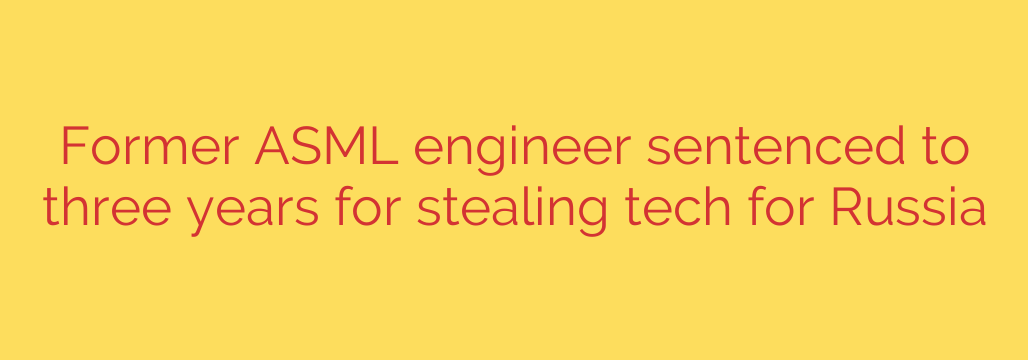
Former Employee Jailed for Major Technology Theft
A serious case highlighting the critical importance of protecting sensitive corporate data has resulted in a former engineer receiving a significant prison sentence. The individual was convicted of stealing vital technological information and trade secrets, reportedly with the intent of transferring this valuable intellectual property to entities in Russia.
The case centers on a former employee of a leading company in the highly advanced semiconductor industry. This sector is crucial for global technology infrastructure, and the proprietary knowledge developed by companies within it represents years of massive investment in research and development. The theft involved highly sensitive data related to the company’s cutting-edge technology, knowledge that could provide a significant competitive advantage to foreign entities.
Investigations revealed that the engineer illicitly accessed and copied vast amounts of confidential data before his departure from the company. The evidence presented during the legal proceedings pointed towards the information being intended for use outside the company’s authorized channels, specifically linking the intended recipient to Russia. This underscores the growing threat of economic espionage and the targeting of advanced technologies by foreign actors.
Following a thorough legal process, the former engineer was found guilty of the charges related to theft of trade secrets and intellectual property. The court handed down a sentence of three years in prison, reflecting the gravity of the crime and its potential impact on national economic security and the company’s competitive standing.
This case serves as a stark reminder for all businesses, especially those operating with valuable intellectual property or in critical infrastructure sectors, about the constant threat of insider theft and corporate espionage. Protecting sensitive data requires robust security measures and vigilant practices.
Key takeaways for businesses looking to safeguard their intellectual property and data include:
- Implement Strong Access Controls: Limit employee access strictly to the data necessary for their roles. Regularly review and update permissions.
- Monitor Data Access and Transfers: Utilize systems to track who accesses sensitive information and when, and set up alerts for unusual activity or large data transfers.
- Enhance Cybersecurity Defenses: While insider threats are distinct, strong perimeter and internal network security can help detect unauthorized access or attempts to exfiltrate data.
- Foster a Culture of Security Awareness: Regularly train employees on the importance of protecting confidential information and recognizing potential security threats or suspicious behavior.
- Plan for Employee Departures: Have clear protocols for revoking access, retrieving company devices, and reminding departing employees of their confidentiality obligations before they leave.
The successful prosecution and sentencing in this case sends a strong message that stealing intellectual property carries severe legal consequences. It also highlights the ongoing need for companies to invest in and maintain comprehensive security strategies to protect their most valuable assets from both external and internal threats. As technology advances and geopolitical competition intensifies, the challenge of safeguarding corporate secrets becomes ever more critical.
Source: https://go.theregister.com/feed/www.theregister.com/2025/07/10/exasml_engineer_dutch_prison/








